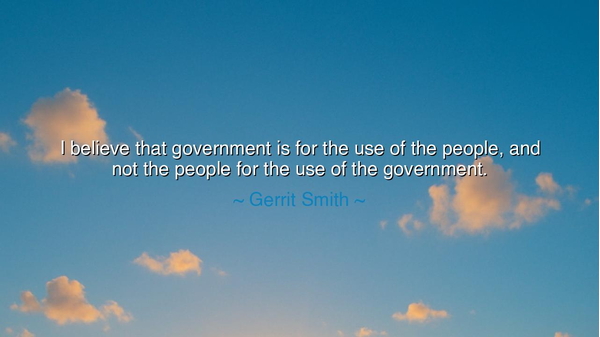
I believe that government is for the use of the people, and not
I believe that government is for the use of the people, and not the people for the use of the government.






In the age of moral struggle and awakening, when the chains of slavery still clattered upon the soil of America, the reformer and abolitionist Gerrit Smith spoke words that resound through the centuries like the toll of a great bell:
"I believe that government is for the use of the people, and not the people for the use of the government."
This declaration was not born in peace or comfort, but in the tempest of conscience — in a time when men and women of courage stood against the cruelty of unjust law. Smith, a man of immense conviction and compassion, saw clearly that government, once meant to protect liberty, had become the instrument of oppression. The laws that should have guarded the sacred rights of humanity were instead shackled to the defense of slavery and power. His words were both a condemnation and a prophecy — a call to remember that the people are the masters of the state, not its servants.
The meaning of his statement is at once simple and eternal: government is a tool, not a tyrant. It is the creation of men for their welfare, not their submission. When Smith declares that government is "for the use of the people," he restores the divine order of democracy — that authority must always bend its knee to justice, and power must always serve those who grant it. For the moment a government forgets its purpose, when it begins to treat citizens as instruments of its will rather than the source of its strength, it ceases to be government and becomes dominion.
This truth, ancient yet ever new, has been tested in every age. From the despots of old who ruled by divine right, to the empires that crushed nations beneath taxes and decrees, the temptation of rulers has always been to treat the governed as fuel for their ambition. But Smith, drawing from both Scripture and conscience, stood in opposition to that old deceit. He saw that true governance is not the glory of rulers but the service of humanity. The state exists to uplift, to protect, to ensure that each soul may live with dignity. And when it forgets this, when it begins to feed upon the very people it was meant to nourish, it becomes a monster — devouring its own children.
Consider the story of the American Revolution, for it is the very soil from which Smith’s belief grew. The colonies rose not out of greed, but out of the cry that government had turned against its people. "No taxation without representation," they declared — a phrase that echoes the same spirit as Smith’s words. The colonists did not reject government itself; they rejected a government that had ceased to be theirs. The tyranny of King George was not in his crown, but in his blindness — in believing that his subjects existed to serve his throne, rather than that his throne existed to serve his subjects. From this rebellion was born a nation, founded on the promise that government derives its just powers from the consent of the governed.
And yet, even within that new nation, the promise faltered. The government that was meant to protect all men allowed some to remain enslaved. The Constitution, noble as it was, was stained by compromise. Gerrit Smith, standing amid the rising tide of the abolitionist movement, saw the hypocrisy for what it was — a government that served wealth and prejudice instead of freedom and equality. His words, then, were not a philosophical musing, but a rebuke to a nation that had forgotten its own birthright. He demanded that America remember that the power of government must flow upward, from the people, never downward, upon them.
But Smith’s teaching does not belong to his century alone. It speaks to every time and place where bureaucracy grows deaf to suffering, where laws are written to preserve privilege rather than protect life. Whenever the citizen becomes a mere cog in a machine of power, his spirit begins to die, and with him, the soul of the nation. Thus, Smith’s declaration is not merely political — it is moral, even spiritual. It reminds us that the duty of the governed is not blind obedience, but vigilant stewardship. A free people must guard their liberty as a gardener guards his garden — pruning the overgrowth of power before it chokes the roots of justice.
Let every listener, then, remember this: Government is a servant, not a master. It is a vessel for the people’s will, not a cage for their freedom. If it strays from its purpose, it must be corrected; if it forgets its duty, it must be reminded. Citizens must not sleep beneath the comfort of authority, but rise as its conscience, questioning, guiding, demanding transparency and truth. For when the people grow silent, the state grows arrogant; when the people lose faith in their own power, tyranny returns in new forms, cloaked in the language of law.
Thus ends the teaching: A government that serves itself is a curse; a government that serves the people is a blessing. Therefore, live not as subjects of power, but as stewards of justice. Remember always the wisdom of Gerrit Smith — that freedom is not granted by rulers, but maintained by the courage of those who dare to remind them why they rule.






AAdministratorAdministrator
Welcome, honored guests. Please leave a comment, we will respond soon